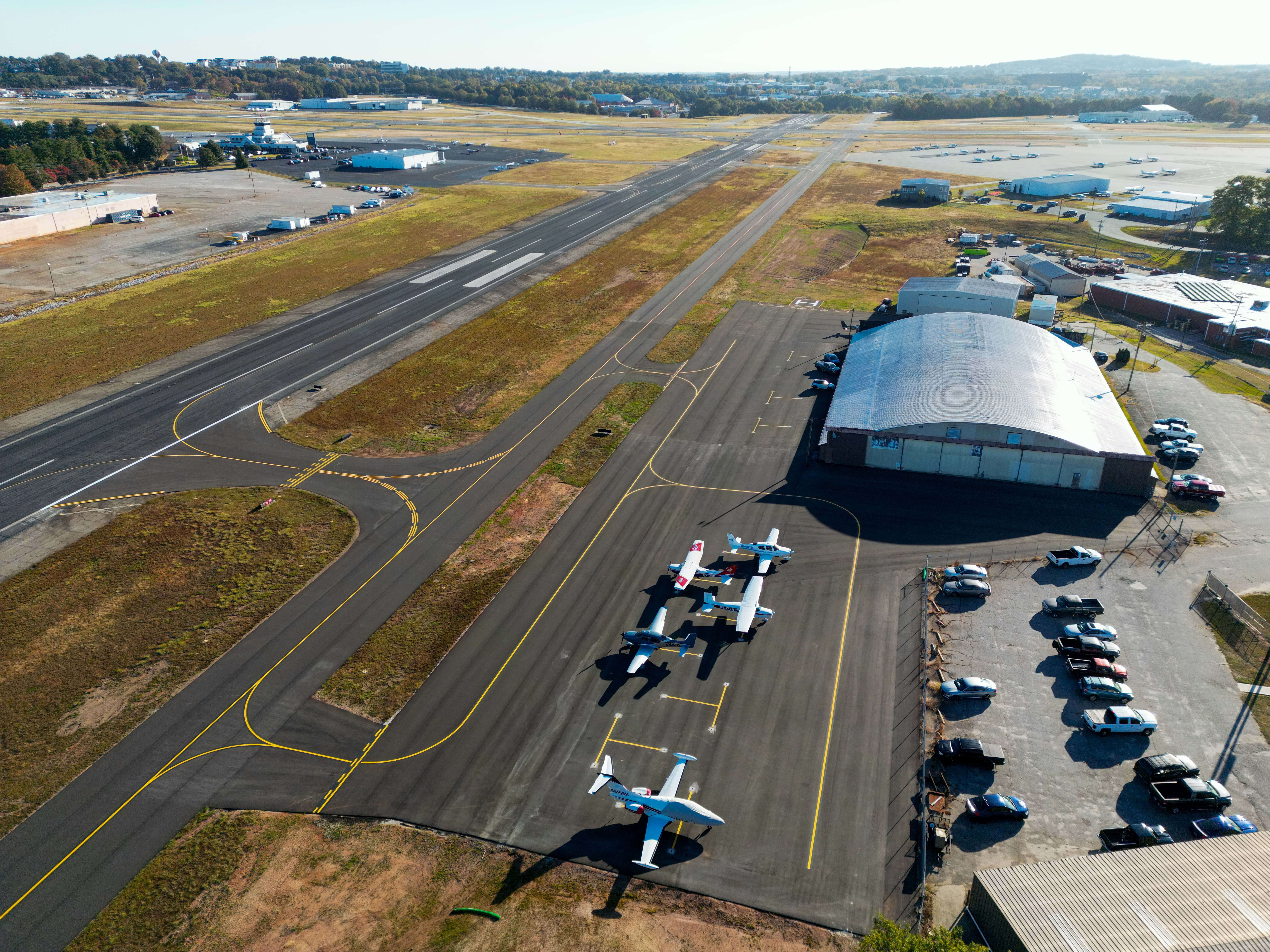Projects
Greenville Downtown Airport

Project Name
Greenville Downtown Airport
Location
Greenville, South Carolina
Owner
Greenville Airport Commission
Project Details
The Greenville Downtown Airport (GMU) is the busiest general aviation airport in South Carolina and King Asphalt played a vital part in its infrastructure improvements. Its location in the heart of Greenville makes it a vital hub for the aviation community.
Due to its high traffic volume, GMU required rehabilitation to its Taxiways C & D. These areas had suffered from years of wear and tear, including deteriorated asphalt surfaces, safety concerns from flat areas holding water, inverted cross slopes, and fading paint markings. King Asphalt took on the challenge of revitalizing these taxiways, which were crucial for accommodating larger and heavier aircraft in the future.
The project was divided into three sections with five phases, including work within the Runway Safety Area (RSA). Temporary closure of one runway was necessary for construction activities. The project involved extensive milling, with nearly 35,000 square yards of asphalt removed. Over 7,000 tons of Surface B HMA (Hot Mix Asphalt) were applied. Some areas required 12″ Full Depth Reclamation (FDR) after proof roll testing.
Furthermore, the expansion of the West Ramp, home to the PF Flyers hangar, was part of the project scope. This phase included removing asphalt and base material, creating an inverted swell, and cut/fill on the ramp area. A minimum of six inches of Graded and Compacted Aggregate (Macadam) Base was applied before the Surface B overlay. The West Ramp expansion also included two new entrances/exits to and from the taxiway Delta. Subgrade removal was repurposed to fill areas for future airport expansion.
The project was completed during the day, ensuring attention to detail and delivering a high-quality product. Safety was paramount, as evidenced by zero recordable injuries and no lost days throughout the project.
Services Provided
- Asphalt Paving & Construction
- Milling & Resurfacing
- Grading and Earthwork
- Full Depth Reclamation
- Traffic Striping
Services Provided
- Asphalt Paving & Construction
- Milling & Resurfacing
- Grading and Earthwork
- Full Depth Reclamation
- Traffic Striping
Project Details
The Greenville Downtown Airport (GMU) is the busiest general aviation airport in South Carolina and King Asphalt played a vital part in its infrastructure improvements. Its location in the heart of Greenville makes it a vital hub for the aviation community.
Due to its high traffic volume, GMU required rehabilitation to its Taxiways C & D. These areas had suffered from years of wear and tear, including deteriorated asphalt surfaces, safety concerns from flat areas holding water, inverted cross slopes, and fading paint markings. King Asphalt took on the challenge of revitalizing these taxiways, which were crucial for accommodating larger and heavier aircraft in the future.
The project was divided into three sections with five phases, including work within the Runway Safety Area (RSA). Temporary closure of one runway was necessary for construction activities. The project involved extensive milling, with nearly 35,000 square yards of asphalt removed. Over 7,000 tons of Surface B HMA (Hot Mix Asphalt) were applied. Some areas required 12″ Full Depth Reclamation (FDR) after proof roll testing.
Furthermore, the expansion of the West Ramp, home to the PF Flyers hangar, was part of the project scope. This phase included removing asphalt and base material, creating an inverted swell, and cut/fill on the ramp area. A minimum of six inches of Graded and Compacted Aggregate (Macadam) Base was applied before the Surface B overlay. The West Ramp expansion also included two new entrances/exits to and from the taxiway Delta. Subgrade removal was repurposed to fill areas for future airport expansion.
The project was completed during the day, ensuring attention to detail and delivering a high-quality product. Safety was paramount, as evidenced by zero recordable injuries and no lost days throughout the project.
